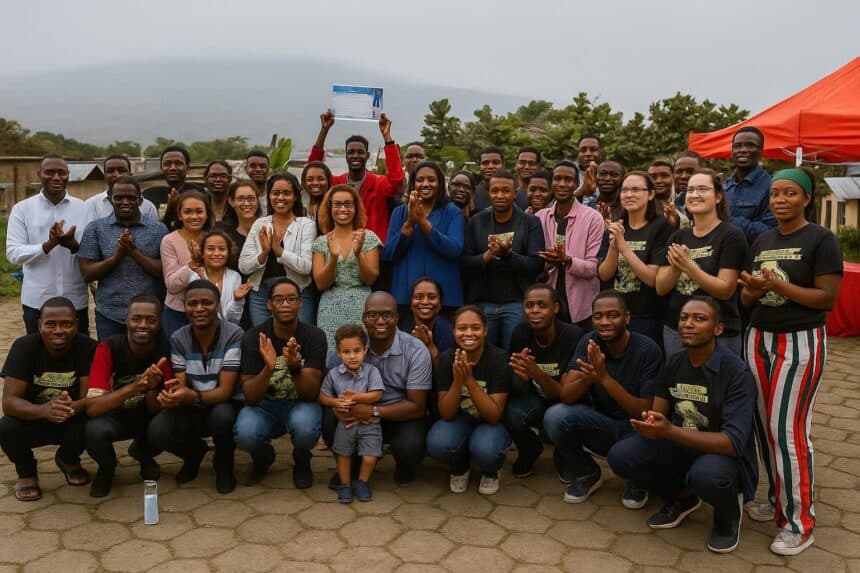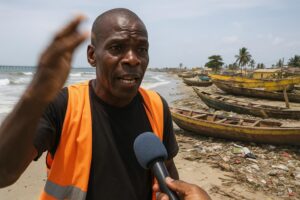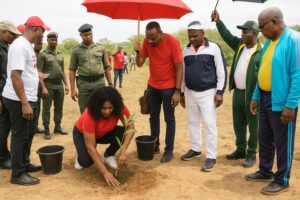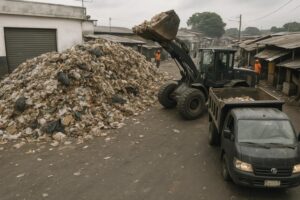Ocean Hackathon splashes into Pointe-Noire
For three fast-paced days, from 17 to 19 October 2025, Pointe-Noire’s seafront turned into a buzzing digital workshop. The city hosted the Congo’s very first Ocean Hackathon, steered by NGO Renatura Congo with the French embassy, Fablab and the young tech studio Yamify.
Well before the laptops opened, more than 350,000 pupils in Pointe-Noire and neighbouring districts had taken part in school workshops on marine protection, an unprecedented mobilisation that gave the hackathon a vast reserve of fresh ideas and made ocean conservation a playground for imagination.
The challenge fed into the international Ocean Hackathon launched by the Campus de la Mer in Brest, allowing Congolese teams to pitch their prototypes on the same digital stage as counterparts from Europe, Asia and the Americas, and to shine a light on Central Africa’s Atlantic front.
Youth power meets coding marathon
Students, young coders, biologists, designers and start-up founders formed mixed crews. Many arrived at dawn with backpacks, sensors and recycled plastics, determined to code, solder and simulate for 48 hours straight so that shoreline waste, fish stocks and coastal tourism could all be monitored in real time.
Among the mentors sat Congo Terminal’s Quality, Compliance and CSR chief, Raïssa Dekambi. Her presence signalled the port operator’s intent to turn bright concepts into concrete tools for the harbour. ‘We are proud to back youth pushing durable solutions for our oceans,’ she told participants.
Dekambi and fellow jurors measured each project against three pillars: technological ingenuity, economic viability and measurable ecological impact. Teams had to demonstrate that a prototype could survive outside the lab, attract local users and, above all, lower the pressure currently weighing on Pointe-Noire’s marine ecosystems.
Innovations born on the shoreline
The hackathon floor quickly filled with augmented-reality mock-ups, dashboards tracking turtle nests and algorithms predicting plastic drift. Some participants harvested satellite data; others repurposed low-cost microcontrollers. The common thread was a conviction that technology made in Congo can speak the same language as global climate science.
After a marathon of coding, nightly mentoring and sunrise pitches on the beach, the jury singled out the three most promising concepts. Prizes included seed funding, incubation space at Yamify and a chance to present the solutions during the international grand final hosted online in December.
Organisers stressed that the greatest reward is access to a network of ocean scientists and entrepreneurs. They argued that connections forged during the weekend can outlast any cheque, helping prototypes reach fishermen, classrooms and municipal planners looking for practical conservation tools.
A partnership rooting green skills
For Renatura Congo, the event crowns nearly a decade of educational outreach. Since 2016, the NGO and Congo Terminal have toured schools with colourful posters, theatre sketches and beach clean-ups, ensuring that environmental vocabulary such as by-catch and micro-plastic enters the everyday speech of primary pupils.
Those same children now return as teens wielding code and sensors, a concrete example of how early awareness campaigns can translate into technical careers. The loop between classroom, coastline and keyboard is what organisers hope will keep the Congolese segment of the Ocean Hackathon alive every year.
Turtles, diplomacy and the blue economy
Beyond education, Renatura’s scientists continue nightly patrols on the beaches south of Pointe-Noire, tagging nesting turtles and mapping erosion. Data gathered over twenty years feed national reports that guide local authorities when designating protected areas or adjusting fishing zones to secure both livelihoods and biodiversity.
The French embassy’s backing added an international layer, offering visas for winning teams to visit maritime research centres in Brest. Diplomats underlined that eco-innovation builds bridges just as strong as trade deals, and that Congo-Brazzaville’s young coders deserve a seat in global blue-economy discussions.
Local authorities also provided logistical support, facilitating internet bandwidth and night-time security so that prototypes could upload massive data sets without interruption. Pointe-Noire’s municipality sees the hackathon as a pilot for future events blending youth employment, digital literacy and concrete answers to climate challenges along the coastline.
With Atlantic currents carrying an estimated 150 tonnes of waste past the Congo coast each year, the organisers believe home-grown digital tools are vital. Cheaper than imported equipment, they can integrate local languages, tide schedules and artisanal fishing habits often overlooked by foreign software.
Prototypes on course for real deployment
The next stop is a follow-up sprint scheduled for February, where the three laureate teams will fine-tune their code alongside Port Authority engineers. If results are conclusive, Congo Terminal may pilot the apps on cargo docks, turning the hackathon’s promises into sensors bolted onto quay walls.
While waiting, residents can replay highlights on Renatura’s social media, wp-signup.php for volunteer beach walks or sign up their classroom for the association’s travelling marine-life exhibition. From smartphones to sandy coves, the first Ocean Hackathon has set a new rhythm for coastal citizenship in Pointe-Noire.
Local cafés, guesthouses and taxi cooperatives reported a welcome uptick in business during the three-day rush, reminding observers that environmental innovation can also boost neighbourhood economies. Several shop owners said they plan to offer discounts to future eco-events, seeing them as reliable off-season revenue streams.






















